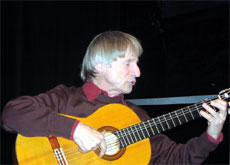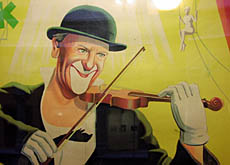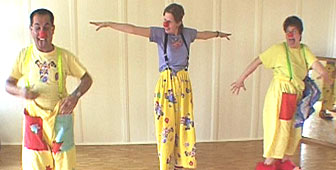What’s behind Dimitri’s smile?

Dimitri, the mime artist and clown, celebrates his 70th birthday this year.
Determined to start 2005 with a smile, swissinfo met him at his theatre in Verscio, near Locarno, which was packed to the rafters with well-wishers and old friends.
Muffled in a red scarf, Dimitri arrived with his guitar and received us in the small auditorium before the official presentation of the Italian translation of his book… and before the audience could claim him as their own.
swissinfo: You are often regarded as a German-Swiss artist who has settled in Ticino. But how do you see yourself?
Dimitri: I am cosmopolitan in outlook; I do not even see myself as belonging to one language community rather than another. I was born in Ascona of Russian parentage; I speak German and Italian but I regard myself as international.
swissinfo: How do you relate as a human being and an artist to Switzerland’s different cultures?
D.: I do not feel tied to any particular culture because my art is based on non-verbal language, on mime, comic effects and music – in short, a universal language that is understood in every corner of the world. As I said before, I am truly a citizen of the world – a concept that really appeals to me.
swissinfo: The Knie circus made you famous. Do you feel that you owe them something, even though in your book you explain that the kind of people who go to the circus would never think of going to the theatre?
D.: We should be quite clear about this: circus-goers are more than welcome to attend the theatre. But it is true that they are often a different kind of audience, maybe less interested in intellectual creativity and more open to popular forms of entertainment. Thankfully, because of my tours with the Knie Circus, I was able to build a reputation, then attract people to my theatre.
swissinfo: Your smile is your trademark. How did it originate and become such a prominent feature?
D.: When people ask me about my smile, I really do not know what to say. It is a gift of the gods, of nature or my mother. It is a talent I was destined to receive. But talent alone is not enough: you have to be able to make the most of it, nurture it, use it in a good and positive way.
swissinfo: In your opinion, do Swiss people laugh enough?
D.: I think so. People are always prepared to laugh, simply because they love doing so. And I think the same applies all over the world. People love to laugh because laughing is good for you. However, if we compare Switzerland with a Latin-American country, for example, we find that South Americans laugh more than Swiss people, despite their poverty and more difficult living conditions. They have a gaiety, which we Swiss lack, despite our high standard of living.
swissinfo: How important are love and a sense of humour in your life?
D.: As I see it, love and a sense of humour go together. Because when comedy is devoid of love, it does not work. Or maybe the jokes work but only by provoking a different kind of laughter, unpleasant, sarcastic, almost diabolical… I am exaggerating but I assure you there is truth in what I am saying. Laughter, I think, should always come from the heart.
My aim is to touch people’s hearts and minds. To bring genuine laughter to their lips. Like the laughter of children, innocent and full of love for humanity.
swissinfo: Are there things that annoy you in people’s views or attitudes?
D.: Naturally! I cannot stand hatred, aggressive behaviour, hypocrisy and unwillingness to talk and seek understanding. I cannot bear lack of respect and lack of tolerance for people who are different.
swissinfo: How would you assess the role and commitment of Swiss intellectuals in social matters?
D.: I would say that artists and intellectuals in our country are fairly active. Of course, their opinions are just a drop in the ocean. But the ocean is a collection of drops. I am thinking, for instance, of the Geneva initiative to relaunch the peace process between Israelis and Palestinians with the involvement of civil society and intellectuals – a project which the [Swiss] foreign minister, Micheline Calmy-Rey, is taking very seriously. Fortunately there are some politicians who are prepared to fight the good fight.
swissinfo: You just mentioned Micheline Calmy-Rey. A lot of people think you have very similar smiles…
D.: That is true. We do have something in common, and not just the breadth of our smiles. We also have similar hair styles. When we met at the Locarno Film Festival, we had a good laugh about it and got on very well together.
swissinfo-interview: Françoise Gehring in Verscio
The Locarno-based publisher Giò Rezzonico, has published the Italian translation of the artist’s autobiography, which is already available in German and French.
“Il clown che è in me” (“The clown in me”) was launched in Ticino in early December.
The book contains amusing anecdotes and striking photographs from Dimitri’s life and career.
Dimitri was born in Ascona on 18 September 1935.
In 1958, he attended courses run by Marcel Marceau in Paris.
In 1962, he married Gunda in Zurich.
In 1970, he began touring with the Knie Circus.
In 1971, he established the Dimitri Theatre at Verscio with Gunda
In 2004, the Dimitri Theatre School became a university teaching department.

In compliance with the JTI standards
More: SWI swissinfo.ch certified by the Journalism Trust Initiative



You can find an overview of ongoing debates with our journalists here. Please join us!
If you want to start a conversation about a topic raised in this article or want to report factual errors, email us at english@swissinfo.ch.